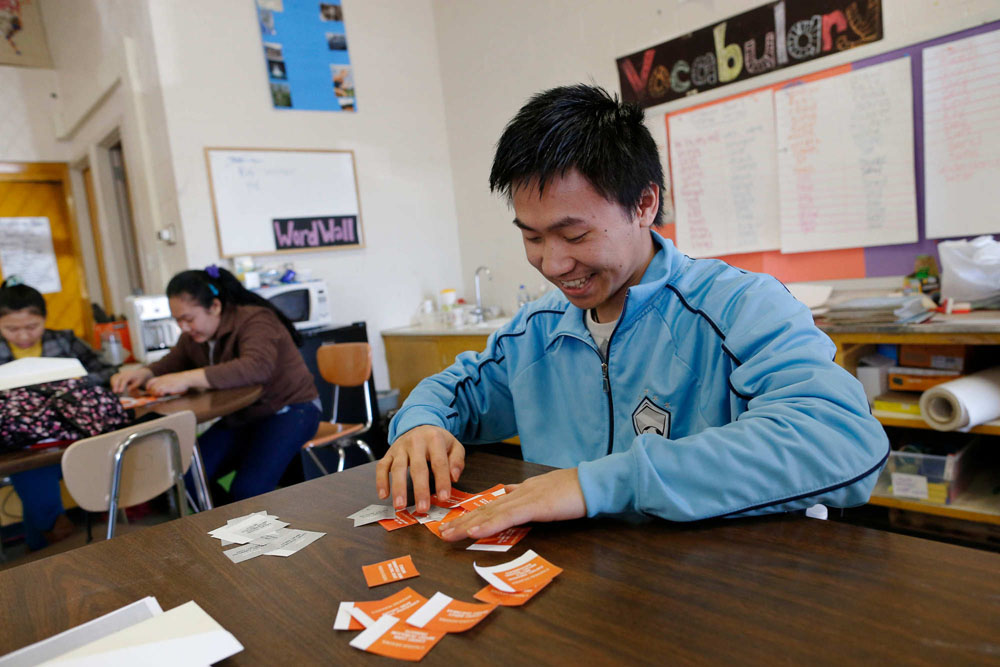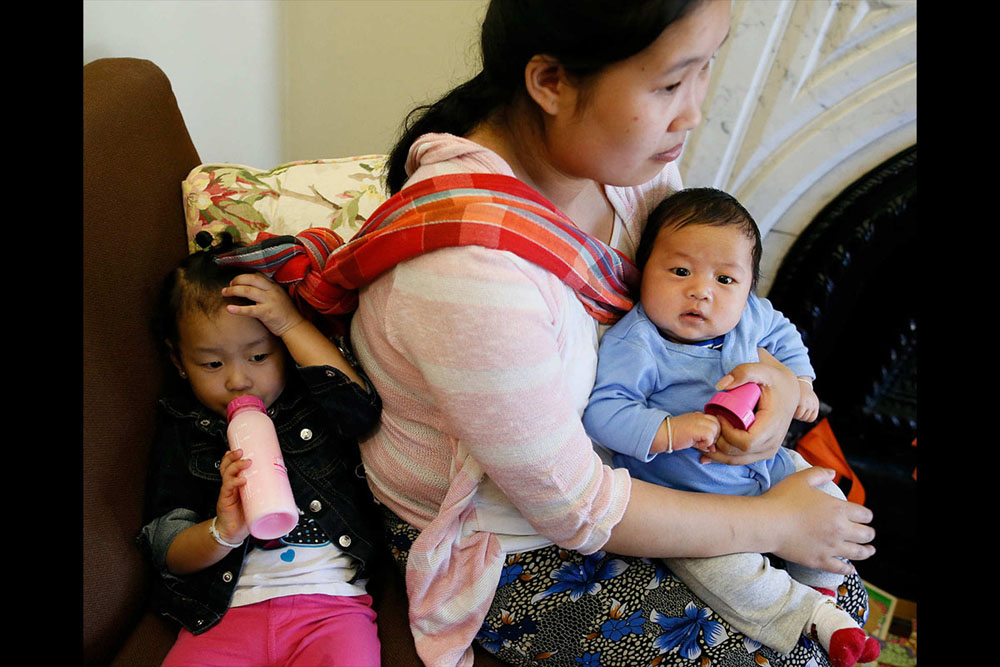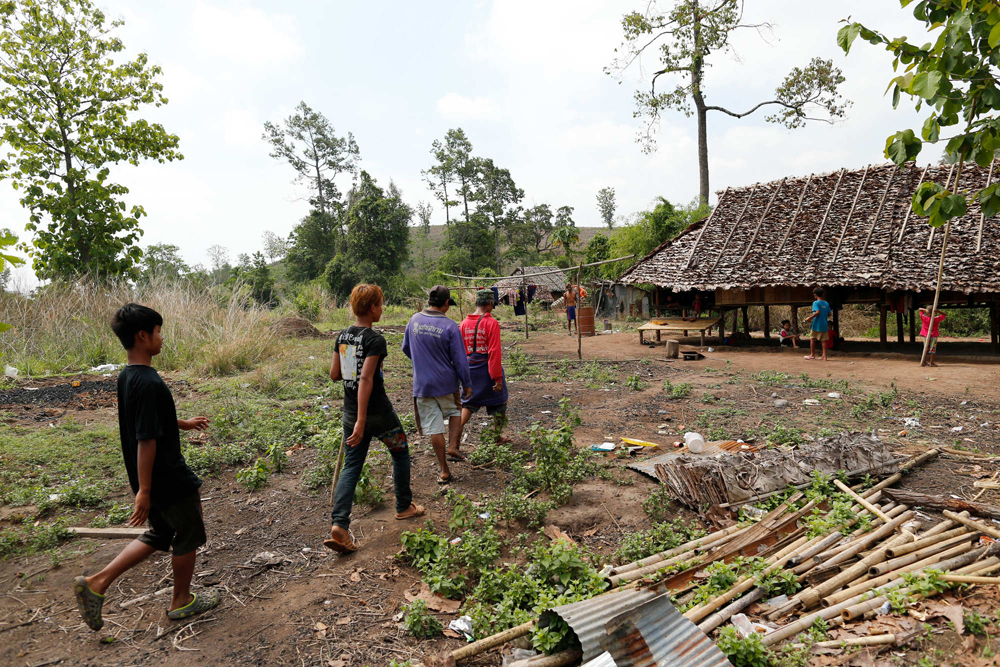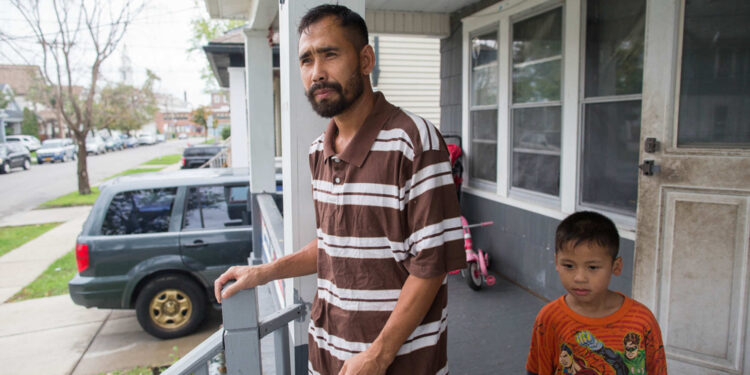The latest in a series by The Buffalo News about refugees who fled conflict in Burma and have made new lives in the American city of Buffalo in western New York State.
Swoin Paw could not understand much of what the “IRS agent” with the foreign accent said when he called, demanding US$9,500. But he knew what the caller meant when he threatened jail.
Within hours, the slim, scruffy, sad-eyed refugee from Burma paid $8,200 to a fraudster. “I didn’t understand,” Swoin Paw, who is now 40, said through an interpreter at his home in Buffalo’s Riverside neighborhood.
For Buffalo’s refugees from Burma, acclimation is a struggle.
Few speak English: Like Swoin Paw, they say they work too long and too hard to find the time to learn it. Many find American ways as foreign as the language, particularly when it comes to disciplining children.
Victims of violence in the country they fled, they isolate themselves in the country they moved to, forming their own community groups and churches where they speak their own languages and preserve their old customs. In a recent survey of 240 adult refugees from Burma conducted by a University at Buffalo professor, respondents identified much more with their native culture than with America.
“A lot of the people, they don’t even write their own language,” said Smiler Greely, who told his own refugee story in the 2010 film “Nickel City Smiler.” “They don’t really know what to do here. They grew up in the jungle.”
When that fraudster called Swoin Paw in spring 2014, saying all those foreign things in a foreign language with a foreign accent, Swoin Paw ran upstairs to fetch his neighbor, May Say. She was 18, and had dropped out of Riverside High School after getting pregnant. She spoke English.
May Say picked up the phone and listened. The caller sounded foreign, she says. And he sounded serious.
“My God,” May Say told Swoin Paw. “You owe money for back taxes. And if you don’t pay, they are going to put you in jail.”
Swoin Paw had only $5,000 in savings. Don’t worry, May Say said. Her family had $2,000. On the spot, she decided to give it to Swoin Paw.
Swoin Paw called another friend, who agreed to chip in $1,200.

Over the next few hours, following the caller’s instructions, Swoin Paw and his neighbor drove from one store to another, from a CVS to a WalMart to a Walgreens to a Rite Aid, to wire the money in chunks to the “IRS agent” with the 202 area code.
The caller insisted that May Say stay on the line the whole time. She did – until they got home and told Swoin Paw’s wife, Eh Sher Paw, what was happening. She had heard of such schemes and knew it must be a fraud. She told May Say to hang up.
Eh Sher Paw, a stout, round-faced woman given to smiling in spite of it all, said through an interpreter that she was angry at her husband. “But I didn’t want him to feel hurt, so I just held it in,” she said. “And then I cried.”
Telling his story while sitting on the floor of his bare-bones living room, which he had meant to renovate with the money he lost to the con man, Swoin Paw looked as if he wanted to cry, too.
None of this would have happened, he said, if he had known English.
A decade after his arrival, Swoin Paw’s English vocabulary is small—which makes him a typical refugee. Isok Kim, the assistant professor of social work at UB who surveyed the refugees from Burma, found that 79 percent had poor English skills.
The local agencies that resettle refugees in Buffalo offer classes, and refugees generally are required to take them if they are not yet working. But dozens of refugees said they stopped taking classes because they had to work. That traps them in low-wage jobs. Swoin Paw tends to the plants in the greenhouses of Wheatfield Gardens.
“So many of them don’t read, they don’t write,” said Eh Knyaw, president of the Karen Society of Buffalo, which represents the city’s largest ethnic group of refugees from Burma. “In a case like that, you can only be a dishwasher.”
Henry Zayamoe, a baby-faced 23-year-old who is now fluent in English, recalled getting hopelessly lost during his early days in Buffalo because he couldn’t read street signs. Other refugees said they dread calls from doctors or their children’s teachers because they don’t understand what is being said.
Dozens of refugees from Burma and other countries line up every day at the Hope Refugee Drop-in Center on West Ferry Street, waiting for a translator to read their mail to them or help them fill out forms for government benefits.

Swoin Paw was napping on his living room sofa on a Friday afternoon in April 2013 when he heard a young boy’s cries. His 9-year-old nephew had pushed his 6-year-old brother down the landing on the stairs.
Swoin Paw did what he said his father would have done. He yelled at the 9-year-old and slapped the boy on the face. Swoin Paw then tended to the 6-year-old to make sure he was all right.
The older boy did what he learned in school. He called 911.
Minutes later, a squad car arrived at Swoin Paw’s house. According to the police report, officers found “fingerprints embedded on the child’s neck” and sent the 9-year-old to Women & Children’s Hospital for treatment.
The officers arrested Swoin Paw. At the city lockup, he donned an orange jumpsuit, waited and prayed. Until an interpreter arrived, he didn’t know why he was there. His sister bailed him out, and records in the case show the charges were dismissed after six months. Prosecutors and defense attorneys often agree to such a resolution when circumstances warrant no further legal action.
Dozens of adult refugees interviewed for this series said they struggle to learn a new way of raising children.
It’s not that the refugees routinely beat their children. The county’s Child Protective Services office has noted nothing disproportional about the number of cases from the Burmese refugee community, said Albert Dirschberger, Erie County’s commissioner of social services.
“There is a cultural difference,” said Lisa Bloch Rodwin, chief Family Court judge in Erie County. “What’s acceptable in many foreign cultures is not acceptable here.”
Mu Te, a delicate refugee from Burma in her early 30s, learned that the hard way on a summer day outside her Black Rock/Riverside home six years ago. Her daughter, then 5, biked into the busy street, so Mu Te ran out and grabbed her and beat her. When the little girl fled, Mu Te threw a rock at her.
A neighbor called the police. Mu Te—who was pregnant at the time—was jailed for a week and later served probation.
“This was 100 percent lack of knowledge,” said Mu Te, crying. “I didn’t understand the rules and regulations here.”
The rules and regulations here say that as soon as parents leave a mark on a child’s body, they can be charged with a crime.
Kids in school are warned about child abuse. That leads to murky child protection cases where a child calls 911 out of anger rather than abuse, said Myra Dahgaypaw, a refugee from Burma who serves as policy adviser for the US Campaign for Burma in Washington, D.C.
“The kids always threaten their parents with 911. And sometimes they call, and parents have to go to jail for these reasons,” she said. “How do we cope with this kind of problem?”
Like most refugees, Swoin Paw lived a hard life far away that defines him. In Thailand, he was arrested three times—for working.
He grew up in a village that escapees from Burma set up in western Thailand. There are many such villages, each a collection of bamboo huts that makes the nearby refugee camps look new and neat. The Thai government considers the villagers illegal immigrants.
When he got old enough, Swoin Paw did menial farm labor, even though it was illegal. So Thai police arrested him again and again. The last time he spent a month in jail, sleeping on a dirt floor in a barracks with 200 other inmates.
That was enough. In 1997, Swoin Paw and his wife moved to a refugee camp west of Bangkok. And when the United States and Thailand struck a deal to allow refugees from the camp to be among the first from Burma to move to America, Swoin Paw and his wife applied.
His life now is much better, he said. He works, his kids are in school and there is enough money to keep the family fed and clothed.
“In Thailand,” he said, “we had nothing.”
Buffalo’s refugees from Burma fled a military government that has persecuted ethnic minorities.

“I’m coming from a not very civil society, and here is a very civil society,” said Myo Thant, a political prisoner in Burma who came to Buffalo after winning asylum in the United States. “I’m not going to fit in right away.”
Separated by different languages and cultures, Burma’s ethnic groups—the Karen, Karenni, Chin, Burmese, Arakanese and Rohingya, plus several others—typically form their own community organizations and religious groups. And it is there that the refugees find community in Buffalo.
Hundreds turned out in February for Chin National Day in North Buffalo. One group of young men and women danced in elaborate red-and-white costumes. Another group of dancers, all men, wore shorts, long plaid sashes and red headdresses with feathers.
“The Chin culture and the American culture are just very different,” said Joshua Thawng Lian, president of the Chin Society of Buffalo.
Many refugees find more frequent refuge in the churches they have set up in Buffalo. Swoin Paw and his wife socialize mostly with a few close friends from the Karen Baptist Church. He said the church is filled with people just like him, people working hard to support their families, good family men and women.
Their children have friends from outside the Karen community, but Swoin Paw and his wife said they fit in best with people who share their language and understand their experiences.
The church, they said, feels a bit like home.
Republished with the kind permission of The Buffalo News

















